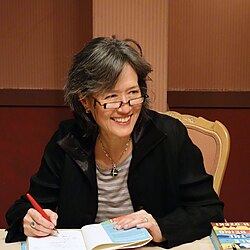Ruth Ozeki Quote
What is it that frightens us about a "novel of causes", and conversely, does fiction have to exist in some suspended, apolitical landscape in order to be literary? Can it not politically and temporally specific and still be in good literary taste? We are leery of literature that smacks of the polemic, instructional, or prescriptive, and I guess rightly so--it's a drag to be lectured to--but what does that imply about our attitudes towards intellectual inquiry? While I enjoy reading kitchen-table novels in which characters are distilled to their emotional essence and their lives stripped of politics and commerce, it simply is not reflective of my experience. I see our lives as being a part of an enormous web of interconnected spheres, where the workings of the larger social, political, and corporate machinery impact something as private and intimate as the descent of an egg through a woman's fallopian tube. This is the resonance I want to conjure in my books.I want to write novels that engage the emotions and the intellect, and that means going head to head with the chaos of evils and issues that threaten to overpower us all. And if they threaten to overpower the characters, then I have to make the characters stronger.
What is it that frightens us about a "novel of causes", and conversely, does fiction have to exist in some suspended, apolitical landscape in order to be literary? Can it not politically and temporally specific and still be in good literary taste? We are leery of literature that smacks of the polemic, instructional, or prescriptive, and I guess rightly so--it's a drag to be lectured to--but what does that imply about our attitudes towards intellectual inquiry? While I enjoy reading kitchen-table novels in which characters are distilled to their emotional essence and their lives stripped of politics and commerce, it simply is not reflective of my experience. I see our lives as being a part of an enormous web of interconnected spheres, where the workings of the larger social, political, and corporate machinery impact something as private and intimate as the descent of an egg through a woman's fallopian tube. This is the resonance I want to conjure in my books.I want to write novels that engage the emotions and the intellect, and that means going head to head with the chaos of evils and issues that threaten to overpower us all. And if they threaten to overpower the characters, then I have to make the characters stronger.
Related Quotes
She might not have read many books. But when she reads a book, she swallows the very words. If you open the books on her shelves, you will find that the front and back covers encase white pages.
About Ruth Ozeki
